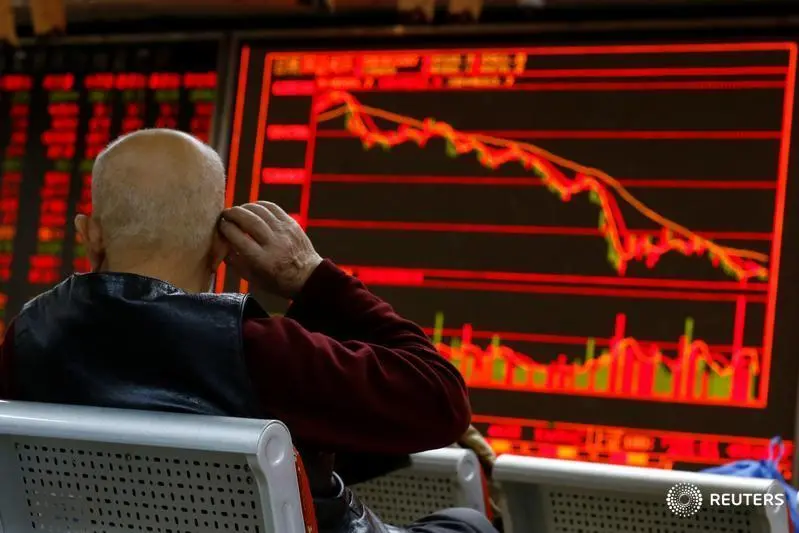PHOTO
TOKYO - Asian shares slipped on Thursday as a surprise deterioration in German and South Korean economic data rekindled fears of slowing global growth, while oil prices pulled back slightly after a sharp run-up earlier in the week.
The Japanese yen JPY= weakened marginally to near 112 a dollar after the Bank of Japan kept policy unchanged at a review on Thursday but pledged to keep interest rates very low at least until early 2020.
It had previously merely said it would keep current extremely low levels of rates for an extended period of time. The BOJ also said it would explore lending ETFs to the market.
The euro steadied after slumping to a 22-month low of $1.114 to the U.S. dollar overnight, driven by a drop in German business confidence which highlighted the divergence between data in the euro zone and the United States.
Data showing the South Korean economy unexpectedly contracted in the first quarter of the year also fuelled worries about the dual-speed nature of the global economy.
MSCI's broadest index of Asia-Pacific shares outside Japan eased 0.27 percent, while Japan's Nikkei average rose 0.4 percent to 22,280.99 points.
Overnight, Wall Street shrugged off some earnings misses but drifted lower at the end of the session, after the S&P 500 and the Nasdaq Composite registered record closing highs on Tuesday.
Chotaro Morita, chief rates strategist at SMBC Nikko Securities, noted hopes that the Chinese economy is bottoming out have contributed to recent rallies in global equities.
"Corporate earnings that have been released so far suggests the worst period for the Chinese economy was over. While that is supportive of share prices, that alone is not enough to keep the rally going for more than a month," he said.
In the currency market, the dollar index, which measures the greenback versus a basket of six major peers, rose to as high as 98.189 overnight, its highest level since May 2017. The index was last quoted at 98.02, down 0.15 percent on the day.
The euro sat at $1.1157, a day after suffering its biggest one-day loss against the dollar since early March.
The deteriorating reading on German business morale, in a survey by the IFO economic institute, bucked expectations for a small improvement.
The British pound held at a two-month low, weighed down by a broad-based rally in the dollar and fading hopes of a breakthrough in Brexit talks between the British government and the opposition. urn:newsml:reuters.com:*:nL5N2266PP The currency pair last stood at $1.291, slightly higher on the day.
U.S. Treasury yields fell across maturities on Wednesday as investors piled into the safe-haven asset after a slew of weak international economic data.
A sharp slowdown in Australian inflation also lifted bond prices, while Premier Li Keqiang in China said authorities should not underestimate the difficulties in the Chinese economy, adding to concerns about global demand.
However, the U.S. yield curve steepened to its widest level since November at one time on Wednesday, which some investors took as a bullish sign for the economy. An inversion in the yield curve last month spooked some investors as it has preceded a recession in the past.
Also, some upbeat earnings results from major U.S. tech firms after the New York close helped to lift the mood, traders say.
Microsoft Corp briefly topped $1 trillion in value for the first time after executives predicted continued growth for its cloud computing business, while Facebook Inc blew past Wall Street profit estimates in the first quarter.
In commodities, oil prices hovered below six-month highs on Thursday as record U.S. output and rising crude stockpiles dampened the impact on markets of tighter U.S. sanctions on Iran and producer club OPEC's continued curbs on supply.
Brent crude futures ticked down 0.1 percent to $74.51 a barrel, while U.S. West Texas Intermediate crude futures dropped 0.2 percent to $65.73 a barrel. Both benchmarks hit 5-1/2-month highs on Tuesday.
Investors are also awaiting the next batch of quarterly earnings and U.S. gross domestic product (GDP) data for the January-March quarter, due on Friday, for signs on whether the recent stock rally can continue.
Economists polled by Reuters expect the U.S. GDP to have grown an annualised 2.1 percent in the first three months of this year, largely keeping the pace from 2.2 percent expansion in the preceding quarter.
(Reporting by Tomo Uetake; Additional reporting by Hideyuki Sano; Editing by Kim Coghill) ((tomo.uetake@thomsonreuters.com; +81-3-6441-1645; Reuters Messaging: tomo.uetake.thomsonreuters.com@reuters.net))
((To read Reuters Markets and Finance news, click on https://www.reuters.com/finance/markets For the state of play of Asian stock markets please click on: 0#.INDEXA ))





















